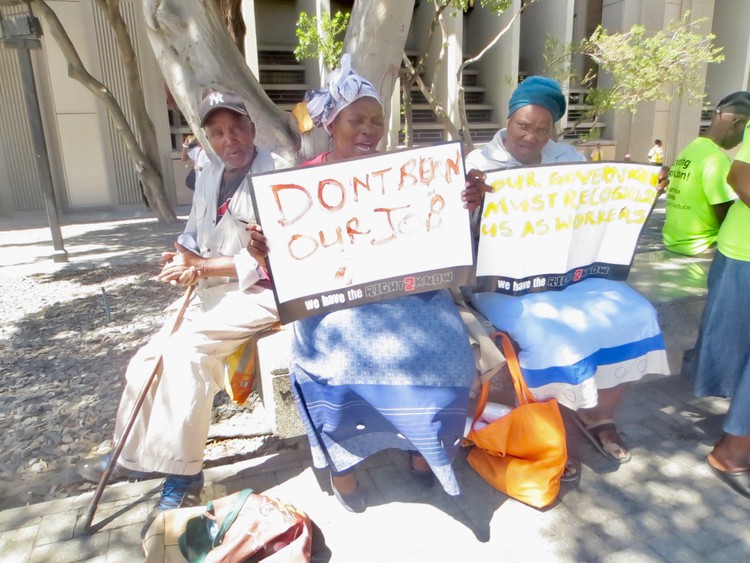
Fudukile Kleibooi Tena (left), founder of the Waste Pickers Movement, is 85 and was at the protest outside the Civic Centre. Photo: Tariro Washinyira
2 March 2018
On Thursday about 20 members of Waste Pickers Movement of the Western Cape picketed outside the Civic Centre to mark International Waste Pickers’ Day. They said they were disappointed that the City of Cape Town refused to accept their memorandum.
The organiser of the protest, Nompumelelo Njana, complained that in July 2016 they had handed a memorandum to the Western Cape provincial government, but did not get any feedback. This is why they decided to go to the City.
Njanja said the movement had asked the provincial government for land to run their project. Now they have appealed to the City for unused open land in the townships.
The City responded to GroundUp: “The picketers were not employees of the City of Cape Town. They are a group of pickers from the community. The memorandum/demands being referred to date back to 2016 and was not served on the City, it was served on the Provincial Government.”
On Friday, the Western Cape government told GroundUp its spokesperson was not available and they only had one spokesperson on duty.
Njanja said, “Big companies like Consol and Nampak have agreed to work with us but for that to happen we need land. The companies need to be sure the containers and other equipment they will provide us with is secure.
“Absence of land is blocking our dream. The City said we should take our demands to the provincial government, but in Khayelitsha where I stay and work I see lots of suitable land for the project but owned by the City of Cape Town.
“Because of lack of land we end up being cheated by the middle-men. We work very hard but at the end, the middle-men pay too little. If we get land, we will form a cooperative and supply to big companies.”
The organisation said in a statement: “As the South African Waste Pickers Association we are fighting for a Recycling Revolution. Don’t burn our livelihoods: Recycle, Reuse, Reduce. This livelihood helps us to put food on the table and take our children to school.”
It said waste pickers make a living by collecting recyclable material on the streets and on landfill sites. It said they were struggling for “the recognition of our profession and work conditions, just as any other worker (minimum wage, social rights, social and health protection, and recognition of our organisations as legitimate)”.
Njanji’s daughter, 30-year-old Siphokazi Mtatsi, said, “Unemployed youth would benefit if the government formalised the group and gave it the opportunity to bid on tenders. As youth we would then be able to train other youth to recycle glass, plastic and bottles.”